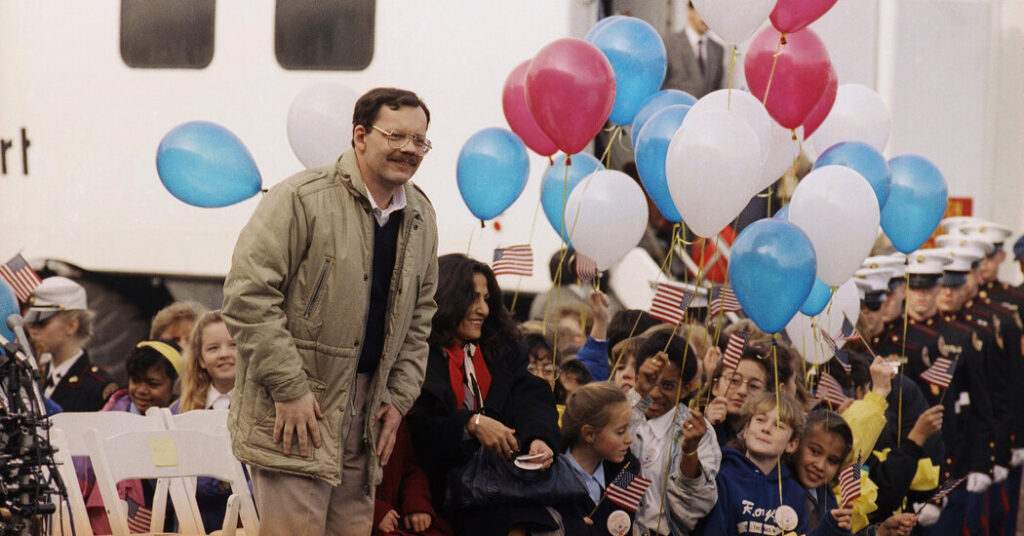American journalist Terry Anderson, the longest-serving Western hostage held in Lebanon and finally freed by Islamic extremists in 1991, died Saturday at his home in Greenwood Lake, New York, in the Hudson Valley. . He was 76 years old.
His daughter, Slome Anderson, said the cause was apparently complications from recent heart surgery.
After an early morning tennis match on March 16, 1985, Mr. Anderson, the Beirut bureau chief for the Associated Press, was dropping off his tennis partner, an Associated Press photographer, at his home when men armed with pistols arrived at his car. They forced the door open and forced him into the Mercedes-Benz. The same car had tried to cut him off the previous day as he was returning to work after lunch at his beachside apartment.
His kidnappers, identified as Shiite Hezbollah militants from Lebanon's Islamic Jihad Organization, beat him, blindfolded him and held him in chains for 2,454 days in about 20 safe houses in Beirut and the Bekaa Valley in southern Lebanon.
The militants, backed by Iran, have signaled retaliation for Israel's use of US-made weapons in earlier attacks against Muslim and Druze targets in Lebanon. They also sought to pressure the Reagan administration to secretly facilitate illegal arms sales to Iran. This embarrassing scheme became known as the Iran-Contra Affair, as the regime secretly planned to use proceeds from arms sales to subsidize its interests. – Contra rebels in Nicaragua.
Mr. Anderson was the last of 18 Western hostages freed by the kidnappers. After his release, he married his fiancée, who was pregnant at the time of his abduction, and met his 6-year-old daughter for the first time.
He said he was not tortured during his captivity, but was beaten and chained. He reportedly spent about a year in solitary confinement on and off.
“There's nothing to hold on to, no way to fix your mind,” he said after the ordeal. “I try to pray every day, sometimes for hours. But there's nothing, just a blank space. I'm not talking to God, but to myself.”
But he found some comfort in the Bible, adding: “My only real defense was to remember that no one can take away my self-respect and dignity; only I can.”
Terry Alan Anderson was born on October 27, 1947 in Lorain, Ohio, where his father, Glenn, was a village police officer. When he was very young, his family moved to Batavia in western New York, where his father was a truck driver and his mother, Lily (Ran) Anderson, a waitress.
After high school, he was accepted and offered a scholarship to the University of Michigan, but decided to join the Marines instead. He served five years as a combat journalist in Japan, Okinawa, and Vietnam, and his last year as a recruiter in Iowa.
After leaving the hospital, he worked at a local television station while earning degrees in journalism and political science from Iowa State University.
He began a two-and-a-half year stint in Lebanon in 1983, after working for the Associated Press in Japan and South Africa.
After his release, he ran a blues bar in Athens, Ohio, and ran unsuccessfully as a Democrat for the Ohio State Senate in 2004. He sued Iran in federal court for $100 million in damages and ultimately recovered about $26 million from Iranian assets. It was frozen in the US. His windfall lasted about seven years. He filed for bankruptcy in 2009.
Anderson and his friend Marcia Landau founded the Vietnam Children's Fund, which has built more than 50 schools in Vietnam. He was chairman emeritus of the Committee to Protect Journalists.
He has also taught at Columbia Graduate School of Journalism, Ohio University Scripps School of Journalism, University of Kentucky, and Syracuse University SI Newhouse School of Public Communication.
In addition to his daughter, Slome, he is survived by his wife, Madeleine Basile, the second of his three wives, whom he married in 1982; another daughter, Gabrielle Anderson; sister Judy Anderson; and his brother Jack Anderson.
Anderson recalls that while his time in captivity was a challenge, so too was adjusting to what he called “the real world.”
“There was a problem and it took a long time to start addressing it,” he said. “People ask me, 'Did you get through it?'” I don't know! Ask your ex-wife — ask your third ex-wife. I don't know; I'm me. “
“I was more damaged than I realized, more than anyone realized,” he said.
“Recovery will take as long as the time spent in prison,” he added.
neil mfarquhar Contributed to the report.


